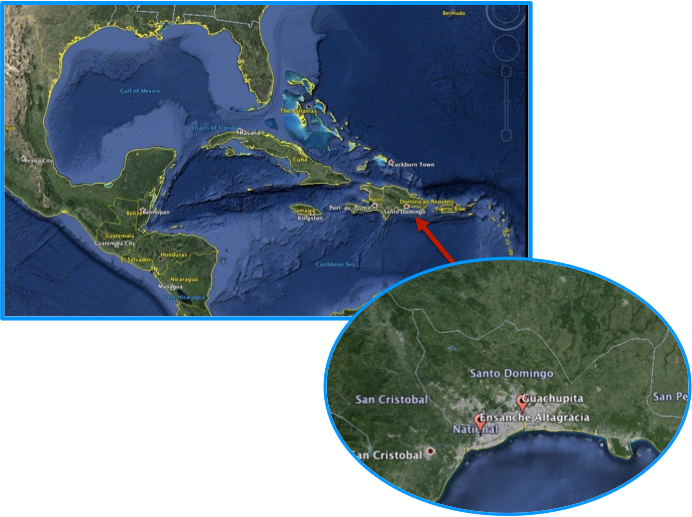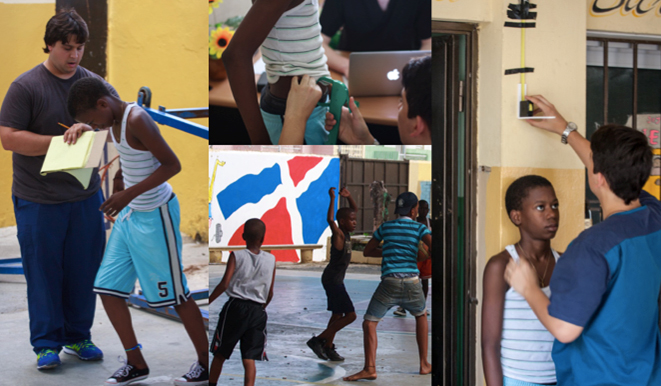The Community Project Component methodology is designed to promote active learning, interpersonal communication and team working skills, while providing the students with early exposure to community health challenges and fostering experiential acquisition of significant knowledge.
Several teaching strategies are employed in order to facilitate this process and promote active pursuit of knowledge by the studentsthrough guided research activities, involving supervised field work, group discussions, portfolio, seminars, independent study and interactive lectures. Some of the frequently used teaching techniques involve:
- Written personal reflections on assigned readings, community experiences, observations and acquired knowledge relevant for the community-based research and interventions. These short reflective essays are included in students’ portfolios, allowing them to monitor their own personal and professional evolution within the O&Med integrated curriculum.
- Guided and supervised experiences in the selected communities, including informal and formal interviews and social interaction with key informants, leaders and other community members.
- Social construction and validation of empirically acquired knowledge and skills through monthly group presentations and discussions on accumulated community experiences.
- Promotion of team work values and skills, as a basic condition for successful community research and health interventions.
- Limited interactive lectures, employed to introduce new key concepts relevant for the field work, and relate those contents to the topics addressed by other courses delivered within the same academic module.
- Contribution to a long-term personal and professional paradigm shift from research “on” the communities, to research “with” the communities.
The Community Project course contents rely heavily on theoretical and applied aspects of Community Based Participatory Research approach, guiding the students through different stages of this process, including a formative research focused on issues prioritized by the community members, development of a participative intervention proposal, its implementation and the short-term impact assessment.These contents, fully integrated with other O&Med longitudinal public health and research related courses, are distributed as follows, within established years and academic terms (AT):
- Year 1: Assessment of the community assets and needs
- AT 1: Definition of a research problem
- AT 2: Design of a study protocol (RAP)
- AT 3: RAP implementation and presentation of results
- Year 2: Intervention proposal, based on the Year 1 assessment
- Years 3-4: Project implementation and impact assessment.
- Year 5 (AT1 & AT2): Strategies to enhance sustainability
- Transferring knowledge to new cohorts of students
- Publication of Community Project Experience
- Preparing Thesis protocol
The first year curriculum contents establish a theoretical and practical basis for students’ engagement in Community Based Participatory Research Activities, forging positive attitudes and communication skills required for successful interactions in culturally diverse environments. These contents include:
- Asset-Based Community Development (ABCD) approach
- Bioethical Principles, Human Rights and Respect to Diversity
- Communication skills focused on the community settings
- Basic interaction and interview skills
- Supervised application of Doctor-Patient Relationship contents
- Research design with emphasis on:
- Participatory Action Research Model
- Rapid Assessment Process (RAP)
- Qualitative Research Methodology
- Research protocol contents and writing skills
- Delimitation of a relevant research problem and aims
- Literature search and references
- Methodology section components
- Research procedures and ethical considerations
- Basics of dissemination formats (presentations, articles, abstracts)
O&Med Community Project interventions are currently developed in two communities in the Dominican Republic: Guachupita and Ensanche Altagracia. Both communities are situated in the province of Santo Domingo, within the 15-30 minutes driving distance from the O&M Medical School facilities (see Figure 3).
Figure 3: Guachupita and Ensanche Altagracia: vulnerable communities in the Santo Domingo area

Over the past few years, different cohorts of O&Med students, guided by faculty members and experienced community leaders, have forged significant and proactive alliances with local organizations and key stakeholders in Guachupita and Ensanche Altagracia, in order to further strengthen the previously existent collaborative efforts between thesecommunities and the Academia. These alliances involve local neighborhood associations, religious organizations, governmental and non governmental institutions, as well as other groups dedicated to community development, including the primary health care units operating at these communities. Actively working with these institutions and community leaders in resource-limited neighborhoods since the first day of their medical career, has contributed to a holistic concept of health among the O&Med students, envisioning the relevance of social determinants of health from a bio-psycho-social perspective in community medicine and primary care settings.
In Guachupita community, a strong collaborative relationship has been established with the local primary school, “San Martin de Porres”, which was involved as a host institution in the participatory research study developed by the 1st cohort of O&Med students, aimed at promoting feasible and culturally appropriate strategies to promote healthy lifestyles through basketball, as a locally relevant sport activity, among Guachupita’s teenagers (see Figure 4). This initiative has led to a formal and long-term alliance with the major public education center in Guachupita, serving as a basis for research and intervention projects developed by subsequent cohorts of students in different public health related issues, including the prevention of mosquito born diseases, such as zika, Chikungunya y dengue in this community.
Figure 4. 1st cohort O&Med students in participative research activities aimed at promoting healthy lifestyles among Guachupita’s teenagers

- O&Med Community Project research platform: strengths and opportunities
Through sustained community-based research and health promotion activities, supported by alliances that were originated years before the formal enrollment of the 1st cohort of O&Med students and further strengthened through Community Project course field activities in Guachupita and Ensanche Altagracia, the O&M Medical School has established a unique research platform in the Dominican Republic, involving strong community-academia relationships and public-private partnerships.
This platform, while providing an active and experience-based learning opportunity for the O&Med students at different stages of their medical education, also opens important possibilities for larger-scale, methodologically demanding research and other collaborative efforts, such as potential cohort studies aimed at promoting healthy lifestyles among different generations of Guachupita residents. Some of the particular strengths of this research platform include:
- Stable and active alliances with community-based organizations in vulnerable communities, including health, educational, religious, cultural and community development sectors.
- Multiple cohorts of medical students trained in theoretical aspects of research methodology and exposed to structured and supervised community-based activities over the first five years of their medical education, assuring a long-term commitment and continuity of research and health promotion initiatives developed by O&Med in the selected communities.
- Experienced multidisciplinary faculty team, committed to further promoting and strengthening community alliances and research activities, not only through Community Project course activities, but also through other longitudinal public health and research methodology related courses.
- Global Health and Biotechnology Research Center operating within the O&M Medical School, providing methodological, administrative and logistical support and orientation to all research efforts developed by O&Med students and faculty, including an active and accredited Institutional Review Board (IRB) in charge of revising and following up on research protocols and planned activities.
